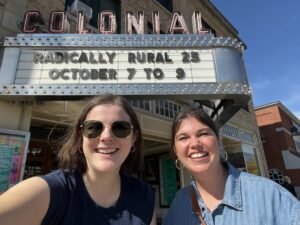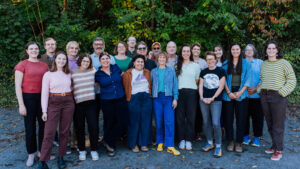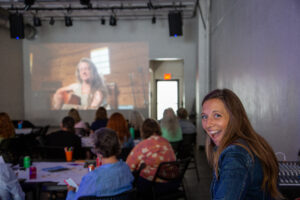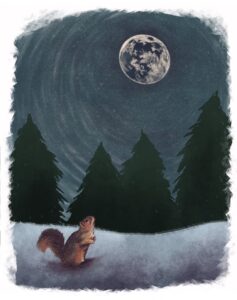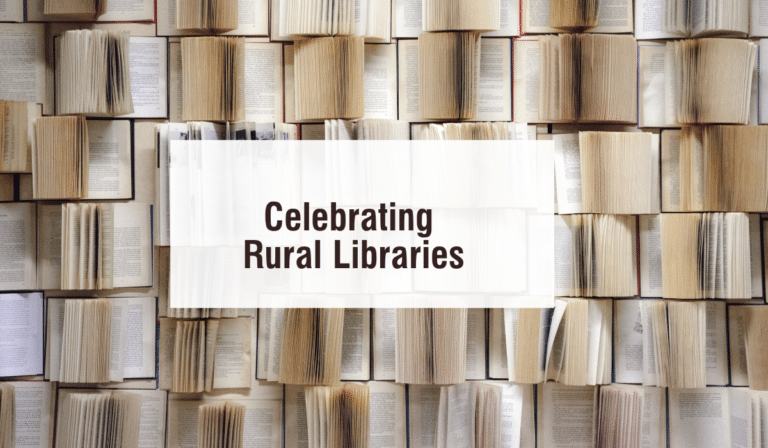
Celebrating Rural Libraries
Books challenges do more than just threaten the freedom to read; they detract from the critical services of local libraries. Read and share these touching stories below. Thank you to all who shared.
"A refuge"
I wanted to share my story of the impact of a local library. I grew up in a household affected by poverty and domestic violence, the local libraries (in particular the Osterhaut Free Library) were literally my refuge. I would often spend the entire day camped out in the comforting safety of the library, where my love of reading developed. Sometimes the librarians would discreetly leave me snacks – even though food was officially prohibited in the library – because they would notice that I’d spend my entire day there without ever leaving to go home and eat.
My mother died from COVID last year. She also had a lifelong love of reading, so we had a canvas featuring a line from Dr. Seuss’ “Oh The Places You’ll Go” hung in the library in her memory.
Bobbi Dempsey
Rooted in history
Our local community library is a center for many things in our small rural town (under 8,000 population) in a county of under 22,000 (that includes the town’s population).
Vehicles are parked in the expansive lot before and after open hours, and on days closed, to have some reliable Internet connectivity with wifi available across the lot. There is plenty of space in the building designed for children and adults, with space for youth to do homework with resources they need, for adults to find solace/a comfort place with clean indoor restrooms and air conditioning, etc. The library system has a variety of media – books of course, on paper, and audio, and large print, and many video media for entertainment and learning. A bonus of the library system is an ‘Interlibrary Loan’ agreement with colleges in the area for local residents to benefit from those resources, too.
During the pandemic the library was a place to find Covid test kits, lunch/snack bags for children forced out of schools (when they closed) but still needing healthy – or any – breakfast or lunch; our local volunteer team with the local public health department held a workshop there on how to build affordable air purifiers (and we provided the materials, free, too); and there are other meetings there too.
The library is situated on a 55 acre lake with a trail around for walking, bike riding, fishing; and you an boat of the lake (for fun or fishing) and portage if you like a short distance to acquire a ‘blue way’ stream that emerges into a small river that goes through the town. The library is not far from our community hospital (we are fortunate that a regional health care system maintains services for us when so many other rural hospitals and clinics are closing); the trail system connects hospital, lake and library.
The library, the Barbara Rose Johns Memorial Library is named for a youth who, in the 1950s, organized a student demonstration against public school ‘apartheid’ in which – following current law in many states, and following social practice in many more states (and not just ‘Southern’ ones) – non-White students were provided ‘separate, and unequal’ schools. Learn more about our remarkable local youth here: https://motonmuseum.org/event/barbara-rose-johns-the-story-behind-the-statue/ Barbara inspired and lead students to walk out in demonstration of disapproval of their treatment, remarking on the facilities and amenities that they did not have that were available in the White-students’ public school. Their action – not just their passion, but their educated, organized approach – was brought into the set of legal cases challenging school racial segregation, that was ended through the Brown v. Board decision of the United States Supreme Court. A local college maintains the old school property where these courageous students took a stand and helped to win a monumental legal decision and moral achievement for all people told that they deserved ‘less than’ others.
Sometimes rural communities hear disparaging commentaries by media, influencers, experts and others we deserve only ‘less than’: ‘less than’ the health care they they have locally, ‘less than’ the education that they have locally, ‘less than’ the community resources that they have locally. Our rural youth, many decades past, took a stand that they deserved the ‘best of’, not ‘less than’.
Our little local library commemorates that passion to learn and the courage of learners to seek the best education available to be the ‘best of’. If you come this way please visit our library.
Edward Strickler
A family affair
Visits to the library have been an important part of my life since I was a young child going with my mother, who despite significant visual difficulties, was an avid reader. She taught my brothers and I the love of books and reading.
My husband tells a similar story of frequent trips to a local library in his hometown of Toledo OH.
Then in turn, we often took our own children to that same library and others nearby to encourage that same love of reading. The videos were pretty cool too!
I don’t believe in book bans. Parents need to be the ones involved in decisions about what their children are ready to learn. Librarians should never be put in the line of fire by politicians with misplaced priorities wasting time fighting culture wars.
Sandra Bondelier
When I get to a new town...
The list when I have moved to a new town, or even just figured to be visiting regularly, has a few ‘gots to’ items.
- Join the affinity program at the grocery store,
- Find the best meat-and-three restaurant, and
- Visit the public library, getting a card if I am eligible.
I came by this commitment to libraries honestly. My mother helped start a library in the coal camp where I was born and served on boards in two of the other towns we lived in along the Kentucky-Virginia border moving to wherever the company was hiring. In my memory, trips to the library happened nearly every week along with visits to the bookmobile when it pulled up in front of the commissary. Today, I have library cards in four states and eight communities.
I never became the volume reader that my mother was and only ever joined one library board. I hope to do better.
Marty Newell, Kentucky
A social hub
The Chesterfield Public Library is a tiny structure in our rural hilltown of 1,186 people in the forested wilds of western Massachusetts. It sits in the historic town center and is only open three days a week. We have a wonderful librarian named Cindy who does so much more than read to kids and check out books. On winter Saturdays, she will often have a spread of goodies and munchies for patrons to sample. In the spring, she buys flats of pansies and encourages people to pot them up to take home and plant.
The library is a social hub of the community where petitions are circulated and gossip is exchanged. I am a former library trustee and very devoted to what the library provides – lectures, children’s programs and before we got high speed rural broadband in 2021, it was where many people on dial-up went to check their e-mail on the two computer terminals.
In the summer, when my flower gardens are in full bloom, I love to bring a bouquet of fresh cut gladiolus or zinnias or asters to the library for all to enjoy. I also bring leftover packets of vegetable and flower seeds for residents to take and we have a seed library to exchange and try different cultivars and varieties.
Even though our collection is small, we can get almost anything on the inter-library loan from participating libraries across central and western Massachusetts as well as from the Commonwealth Catalog that covers the state college and university library system.
I feel blessed to have such a wonderful resource just a mile and a half away from my home.
Matt L. Barron
Chesterfield, Massachusetts
Battling misinformation
Katie Leach, librarian for the Shasta Community College library, deserves the spotlight for her work in Shasta County, says Annelise Pierce.
“Our rural county is a hotspot for misinformation and controversy (just google us!) and Katie has done impressive work on increasing access to media literacy and how to spot misinformation with her students.”
—Annelise Pierce
Freedom
The tiny town of Bovill, Idaho, population 300 on a great day had a library branch through the county. The library had been located in many different places because the community knew the value and the enjoyment of reading. When the community saw a grant opportunity, they applied to the Idaho Historical Foundation to purchase the Catholic Church. Through volunteer sweat equity, the church was converted into an inviting place for all ages to check out books, engage in different activities, and use technology. There is no greater feeling than to have the freedom of being surrounded by books and knowing that you have access to all of them
Jan Eck
A Librarian's Service
Growing up, I lived in a rural place. A quaint town in Louisiana where strawberries abound. I grew up two blocks from a library and that library changed my life. It gave me autonomy at a young age – I could read anything in the children’s room and that felt like a great power.
As I got older, I thought I was a city person. So desperate to escape the little, rural swamp town I grew up in, I moved to New Orleans and went to college to study music. While in school, I worked in the library. And just like that, another phase of my life where the library played an undeniable role in my development.
I graduated and I drifted. I sang in bars and worked menial jobs, floating through the year after college wondering what to do with my life. Knowing I had a purpose, just not quite being able to grasp it. I’m a musician through to my core, but I needed to get out of New Orleans. So, I moved to another big city – Atlanta.
Three months in, I knew I had to get out. It was too big, too loud, too spread out. I felt listless and without a mooring. Then one day, I accepted my fate.
I was going to be a librarian.
Just like that, I changed direction again. I moved to Tulsa, Oklahoma and I struggled. I struggled in a way I had never struggled before. However, all things do eventually come to an end. I escaped Tulsa with my Master’s degree and I moved to the mountains in Tennessee. A tiny town in a valley. My family had moved there to try something new. I lucked into a job at the local university, and I started my professional life.
Shortly after arriving, my family went home to Louisiana and suddenly I was alone again. No community around me. Stuck in another rural place praying to get out. I even wrote a song called “27” with a lyric that says:
“This small room, this small town, I gotta get out, I’m sure I will soon.”
As time passed, I built a community around myself. A community of amazing people. It became pretty clear that I am not a city person. I am a rural person. I grew up rural, I choose to live in a rural place. I love my small town and the community that affords me. I love the people who care for me and I for them.
The reason I struggled in Tulsa or Atlanta wasn’t the traffic, or the commute, or the rush of the big city. It was the fact that I had no community whatsoever. No safety net and no one to care about. I was on a deserted island, population: me.
The one thing that saved me in those dark days? The library. A microcosm of community that I could escape to when things felt too heavy. A place where people greeted me with kindness and a smile when I so desperately needed it.
Rural libraries are absolutely necessary for more reasons that I could ever put into a list. Libraries are no longer book depositories; they are knowledge centers. They are places that build and foster community. Those who are cutting off funding and shutting down libraries aren’t just punishing librarians; they’re also punishing their communities from having access to vital services. Libraries are hubs for the community and the efforts to shut them down reflect the fear that the promise of community instills in some.
It is difficult out there right now for many librarians, especially public and school librarians, as book banning sky rockets and they are criminalized with horrible, derogatory terms on a daily basis by our legislators.
And yet, they still continue to serve us and the communities they deeply care about.
I’ll tell you a secret. Librarians aren’t in it for the big bucks. Not for power, not for greed. They’re in it because they’re the helpers. They’re community. They believe in libraries and their undeniable value.
This week, I celebrate my rural librarians especially. They are catching the brunt of this vitriolic polarization of politics that threatens our libraries. However, it doesn’t just threaten our libraries, it threatens our sense of community. We will lose far more than access to books and internet if we shut down our libraries. We will lose sacred places that provide equity in our communities.
Librarians have shaped so many parts of my life, always for the better. They have showed me the world, they have given me my career, and they gave me community when I felt lost.
This National Library Week, I honor the librarians in my life. You have changed me for the better. It is obvious that the fight will only become fiercer from here as we watch them defund libraries and ban books, but librarians are not ones to lie down and take it. We will fight for our communities. Fight for access. Fight for equity.
Because that’s what librarians do. We serve.
Alex Sharp
Discovery
Kim Phinney, Co-founder, Rural Youth Catalyst



